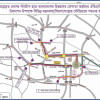Becoming A Developing Nation: Bangladesh reaches A Milestone

Bangladesh has stepped into a new journey as it qualified to graduate into a developing nation from a Least Developed Country (LDC) after 45 years.
The United Nations Committee for Development Policy (UN CDP) recommended the graduation in its final evaluation on Friday.
Bangladesh is scheduled to officially become a developing country in 2026 as the UN committee recommended that the country should get five years, instead of three, to prepare for the transition due to the impact of the Covid-19 on its economy.
Until 2026, the country will continue to enjoy the trade benefits as an LDC.
The recommendations will be sent to the United Nations Economic and Social Council (ECOSOC) for endorsement in June and the UN General Assembly is scheduled to approve the proposal in September.
The development comes when Bangladesh gears up for celebrating the golden jubilee of its independence next month.
Taffere Tesfachew, chair of the CDP subgroup on LDCs, shared the decision of recommendation at a briefing on Friday after the second triennial review of the LDC category of UN CDP. The five-day review meeting began on February 22 at the UN Headquarters in New York.
Bangladesh has met, for the second time, all the three eligibility criteria for the graduation involving income per capita, human assets index (HAI), and economic and environmental vulnerability index (EVI).
Myanmar and Lao People's Democratic Republic also met the graduation criteria for the second consecutive time. Nepal met the criteria in 2018. The UN CDP, however, deferred the decision on Myanmar and Timor-Leste to the 2024 triennial review, Taffere Tesfachew said.
In the briefing, he also said they would take some other measures considering the fallouts of the Covid-19 on the economy of the newly graduated countries. He also said they would analyse at the 2024 triennial review if the extension was needed.
They will also improve monitoring systems, pay special attention to Covid-19 impacts, and alert ECOSOC of action whenever needed.
Prime Minister Sheikh Hasina formally announced the graduation status of Bangladesh yesterday.
"This achievement is an outcome of our relentless planning, hard work and efforts over the last 12 years. The people of this country have made it possible. We have only provided the people with policy support from the government," Hasina said at a virtual press conference which she attended from the Gono Bhaban. It was her first press conference in the last 11 months.
As per their schedule, the UN CDP completed its final round of assessment on Bangladesh based on the country's economic data up to 2019.
The United Nations Conference on Trade and Development (UNCTAD) had made a separate report on Bangladesh's economic vulnerability profile following the Covid-19 fallout.
The UN CDP has given the final recommendation based on the UNCTAD report and a position paper of Bangladesh government that was submitted to the UN committee earlier for assessment.
The UN CDP in its second triennial review assessed the economy of Bangladesh and found a strong fulfillment of all three required conditions for the graduation.
Bangladesh was well ahead in the gross national income (GNI) criterion: its per capita income was $1,827 in 2019 against the threshold of $1,222.
In the HAI criterion, the country's score stood at 75.4 points, well above the requirement of 66. In the EVI, a country's score has to be less than 32. Bangladesh's score was 27.3.
The prime minister said the country's per capita income was 1.7 times higher than the required threshold. The per capita income is now $2,064, she said.
Although the concept of the LDCs originated in the late 1960s, the first group of LDCs was listed by the United Nations back in 1971. LDCs are usually low-income countries confronting severe structural impediments to sustainable development. While there were 25 countries in the list of LDCs in 1971, the number is 47 now.
Bangladesh was first listed as an LDC in 1975. So far, a total of five countries have graduated from the LDC status. These are -- Botswana (1994), Cape Verde (2007), The Maldives (2011), Samoa (2011) and Equatorial Guinea (2017).
When Bangladesh was included in the LDC group in 1975, the poverty rate of the country was 83 percent. In 1981-82, the figure was 74 percent.
The country's poverty rate declined to 20.5 percent in 2019 from 40 percent in 2005, according to data from the Bangladesh position paper. Similarly, the extreme poverty rate also declined sharply to 10.5 percent in 2019 from 25.1 percent in 2005, the paper said.
However, different studies said the poverty rate has increased a bit because of the fallouts of Covid-19.
"The current Bangladesh and the country an era ago are not the same. Today's Bangladesh is a changed Bangladesh," Hasina said at the press conference.
Bangladesh will reach a new height globally following the graduation from LDC to a developing one, said the prime minister. "We will have to uphold this achievement and will have to make it sustainable."
The graduation to a developing country is a special step for the country in its efforts to achieve the Sustainable Development Goal by 2030, become a higher middle -income country by 2031 and a developed country by 2041, Hasina said.
The construction of some mega projects like the Padma Multipurpose Bridge, Metrorail, Elevated Expressway, Tunnel under the Karnaphuli river, Rooppur Nuclear Power Plant, Maheshkhali–Matarbari Integrated Development Projects will be completed this year or the next, Hasina said.
Moreover, the government has also been developing 100 special economic zones and more than two dozens Hi-Tech parks across the country. The completion of the construction of the mega projects will create a new impetus in the economy to reach the targeted economic development of the country, she added.
After the expiry of the transition period, Bangladesh will have to compete globally as the graduation will come to an effect officially. But the European Union previously said it would continue the same trade benefit for Bangladesh up to 2027.


 For all latest news, follow The Daily Star's Google News channel.
For all latest news, follow The Daily Star's Google News channel. 








Comments